Exergaming for dementia and mild cognitive impairment
- PMID: 39319863
- PMCID: PMC11423707
- DOI: 10.1002/14651858.CD013853.pub2
Exergaming for dementia and mild cognitive impairment
Abstract
Background: Dementia and mild cognitive impairment are significant contributors to disability and dependency in older adults. Current treatments for managing these conditions are limited. Exergaming, a novel technology-driven intervention combining physical exercise with cognitive tasks, is a potential therapeutic approach.
Objectives: To assess the effects of exergaming interventions on physical and cognitive outcomes, and activities of daily living, in people with dementia and mild cognitive impairment.
Search methods: On 22 December 2023, we searched the Cochrane Dementia and Cognitive Improvement Group's register, MEDLINE (Ovid SP), Embase (Ovid SP), PsycINFO (Ovid SP), CINAHL (EBSCOhost), Web of Science Core Collection (Clarivate), LILACS (BIREME), ClinicalTrials.gov, and the WHO (World Health Organization) meta-register the International Clinical Trials Registry Portal.
Selection criteria: We included randomised controlled trials (RCTs) that recruited individuals diagnosed with dementia or mild cognitive impairment (MCI). Exergaming interventions involved participants being engaged in physical activity of at least moderate intensity, and used immersive and non-immersive virtual reality (VR) technology and real-time interaction. We planned to classify comparators as inactive control group (e.g. no treatment, waiting list), active control group (e.g. standard treatment, non-specific active control), or alternative treatment (e.g. physical activity, computerised cognitive training). Outcomes were to be measured using validated instruments.
Data collection and analysis: Two review authors independently selected studies for inclusion, extracted data, assessed the risk of bias using the Cochrane risk of bias tool RoB 2, and assessed the certainty of the evidence using GRADE. We consulted a third author if required. Where possible, we pooled outcome data using a fixed-effect or random-effects model. We expressed treatment effects as standardised mean differences (SMDs) for continuous outcomes and as risk ratios (RRs) for dichotomous outcomes, along with 95% confidence intervals (CIs). When data could not be pooled, we presented a narrative synthesis.
Main results: We included 11 studies published between 2014 and 2023. Six of these studies were pre-registered. Seven studies involved 308 participants with mild cognitive impairment, and five studies included 228 individuals with dementia. One of the studies presented data for both MCI and dementia separately. Most comparisons exhibited a high risk or some concerns of bias. We have only low or very low certainty about all the results presented below. Effects of exergaming interventions for people with dementia Compared to a control group Exergaming may improve global cognitive functioning at the end of treatment, but the evidence is very uncertain (SMD 1.47, 95% 1.04 to 1.90; 2 studies, 113 participants). The evidence is very uncertain about the effects of exergaming at the end of treatment on global physical functioning (SMD -0.20, 95% -0.57 to 0.17; 2 studies, 113 participants) or activities of daily living (ADL) (SMD -0.28, 95% -0.65 to 0.09; 2 studies, 113 participants). The evidence is very uncertain about adverse effects due to the small sample size and no events. Findings are based on two studies (113 participants), but data could not be pooled; both studies reported no adverse reactions linked to the intervention or control group. Compared to an alternative treatment group At the end of treatment, the evidence is very uncertain about the effects of exergaming on global physical functioning (SMD 0.14, 95% -0.30 to 0.58; 2 studies, 85 participants) or global cognitive functioning (SMD 0.11, 95% -0.33 to 0.55; 2 studies, 85 participants). For ADL, only one study was available (n = 67), which provided low-certainty evidence of little to no difference between exergaming and exercise. The evidence is very uncertain about adverse effects of exergaming compared with alternative treatment (RR 7.50, 95% CI 0.41 to 136.52; 2 studies, 2/85 participants). Effects of exergaming interventions for people with mild cognitive impairment (MCI) Compared to a control group Exergaming may improve global cognitive functioning at the end of treatment for people with MCI, but the evidence is very uncertain, (SMD 0.79, 95% 0.05 to 1.53; 2 studies, 34 participants). The evidence is very uncertain about the effects of exergaming at the end of treatment on global physical functioning (SMD 0.27, 95% -0.41 to 0.94; 2 studies, 34 participants) and ADL (SMD 0.51, 95% -0.01 to 1.03; 2 studies, 60 participants). The evidence is very uncertain about the effects of exergaming on adverse effects due to a small sample size and no events (0/14 participants). Findings are based on one study. Compared to an alternative treatment group The evidence is very uncertain about global physical functioning at the end of treatment. Only one study was included (n = 45). For global cognitive functioning, we included four studies (n = 235 participants), but due to considerable heterogeneity (I² = 96%), we could not pool results. The evidence is very uncertain about the effects of exergaming on global cognitive functioning. No study evaluated ADL outcomes. The evidence is very uncertain about adverse effects of exergaming due to the small sample size and no events (n = 123 participants). Findings are based on one study.
Authors' conclusions: Overall, the evidence is very uncertain about the effects of exergaming on global physical and cognitive functioning, and ADL. There may be an improvement in global cognitive functioning at the end of treatment for both people with dementia and people with MCI, but the evidence is very uncertain. The potential benefit is observed only when exergaming is compared with a control intervention (e.g. usual care, listening to music, health education), and not when compared with an alternative treatment with a specific effect, such as physical activity (e.g. standing and sitting exercises or cycling). The evidence is very uncertain about the effects of exergaming on adverse effects. All sessions took place in a controlled and supervised environment. Therefore, we do not know if exergaming can be safely used in a home environment, unsupervised.
Copyright © 2024 The Authors. Cochrane Database of Systematic Reviews published by John Wiley & Sons, Ltd. on behalf of The Cochrane Collaboration.
Conflict of interest statement
Alexandra Voinescu: none known Themis Papaioannou: none known Karin Petrini: none known Danaë Stanton Fraser: none known
Figures
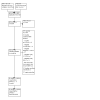
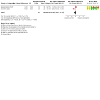
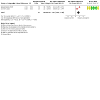
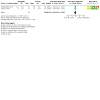
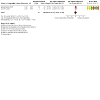

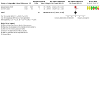

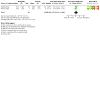
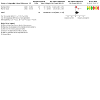
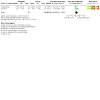





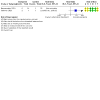
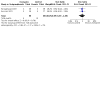
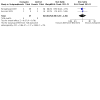
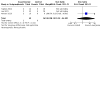
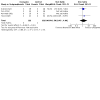
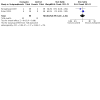
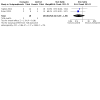
Update of
- doi: 10.1002/14651858.CD013853
Similar articles
-
Cognitive training interventions for dementia and mild cognitive impairment in Parkinson's disease.Cochrane Database Syst Rev. 2020 Feb 26;2(2):CD011961. doi: 10.1002/14651858.CD011961.pub2. Cochrane Database Syst Rev. 2020. PMID: 32101639 Free PMC article.
-
Computerised cognitive training for 12 or more weeks for maintaining cognitive function in cognitively healthy people in late life.Cochrane Database Syst Rev. 2020 Feb 27;2(2):CD012277. doi: 10.1002/14651858.CD012277.pub3. Cochrane Database Syst Rev. 2020. PMID: 32104914 Free PMC article.
-
Cognitive training for people with mild to moderate dementia.Cochrane Database Syst Rev. 2019 Mar 25;3(3):CD013069. doi: 10.1002/14651858.CD013069.pub2. Cochrane Database Syst Rev. 2019. PMID: 30909318 Free PMC article.
-
Computerised cognitive training for preventing dementia in people with mild cognitive impairment.Cochrane Database Syst Rev. 2019 Mar 13;3(3):CD012279. doi: 10.1002/14651858.CD012279.pub2. Cochrane Database Syst Rev. 2019. PMID: 30864747 Free PMC article.
-
Animal-assisted therapy for dementia.Cochrane Database Syst Rev. 2019 Nov 25;2019(11):CD013243. doi: 10.1002/14651858.CD013243.pub2. Cochrane Database Syst Rev. 2019. PMID: 31763689 Free PMC article.
Cited by
-
Immersive virtual reality or computerised mindfulness meditation for improving mood? Preliminary efficacy from a pilot randomised trial.Front Psychol. 2023 Oct 25;14:1157469. doi: 10.3389/fpsyg.2023.1157469. eCollection 2023. Front Psychol. 2023. PMID: 37954176 Free PMC article.
-
Associations between reversible and potentially reversible cognitive frailty and falls in community-dwelling older adults in China: a longitudinal study.BMC Geriatr. 2025 Apr 5;25(1):224. doi: 10.1186/s12877-025-05872-2. BMC Geriatr. 2025. PMID: 40188026 Free PMC article.
-
Domain-Specific Evaluation of Exergame Metrics Among Older Adults With Mild Neurocognitive Disorder: Secondary Analysis of 2 Randomized Controlled Trials.JMIR Serious Games. 2025 May 21;13:e65878. doi: 10.2196/65878. JMIR Serious Games. 2025. PMID: 40397948 Free PMC article.
-
Is exergaming a viable exercise option for obese black women?Contemp Clin Trials. 2025 Apr;151:107846. doi: 10.1016/j.cct.2025.107846. Epub 2025 Feb 12. Contemp Clin Trials. 2025. PMID: 39952553 Clinical Trial.
References
References to studies included in this review
Arshad 2023 {published and unpublished data}
-
- Arshad H, Khattak HG, Anwar K. Effect of exergames by using Xbox 360 Kinect on cognition of older adults with mild cognitive impairment. Rawal Medical Journal 2023;48(4):994-8.
Hughes 2014 {published data only (unpublished sought but not used)}
Karssemeijer 2019 {published data only}
-
- Karssemeijer EG, Aaronson JA, Olde Rikkert MG, Kessels RP. A randomized controlled trial on the effect of physical and combined physical and cognitive dual-task training on frailty in early stage dementia patients. European Geriatric Medicine 2018:S43.
-
- Karssemeijer EG, Aaronson JA, Olde Rikkert MG, Kessels RP. P3-315: a randomized controlled trial on the effect of exergaming and single aerobic training on cognitive functioning in older adults with dementia. July 24, 2018 Alzheimer's Association International Conference: P3-01: Poster Presentations. Alzheimer's & Dementia 2018;14(7S_Part_22):P1201. [DOI: 10.1016/j.jalz.2018.06.1676] - DOI
-
- Karssemeijer EG, Bossers WJ, Aaronson JA, Sanders LM, Kessels RP, Rikkert MG. Exergaming as a physical exercise strategy reduces frailty in people with dementia: a randomized controlled trial. Journal of the American Medical Directors Association 2019;20(12):1502-8. [DOI: 10.1016/j.jamda.2019.06.026] - DOI - PubMed
Lee 2021 {published data only}
-
- Lee G-H. Effect of virtual reality-based training program on patients with mild cognitive impairment. Asia-Pacific Journal of Convergent Research Interchange 2021;7(1):71-80. [DOI: 10.47116/apjcri.2021.01.07] - DOI
Manser 2023 {published data only}
-
- Manser P, Michels L, Schmidt A, Barinka F, De Bruin ED. Effectiveness of an individualized exergame-based motor-cognitive training concept targeted to improve cognitive functioning in older adults with mild neurocognitive disorder: study protocol for a randomized controlled trial. JMIR Research Protocols 2023;12(e41173):1-30. [DOI: 10.2196/41173] - DOI - PMC - PubMed
-
- Manser P, Poikonen H, De Bruin ED. Feasibility, usability, and acceptance of “Brain-IT”— a newly developed exergame-based training concept for the secondary prevention of mild neurocognitive disorder: a pilot randomized controlled trial. Frontiers in Aging Neuroscience 2023;15:1-27. [DOI: 10.3389/fnagi.2023.1163388] - DOI - PMC - PubMed
-
- NCT04996654. Feasibility of a novel exergame-based training concept for older adults with mild neurocognitive disorder. https://clinicaltrials.gov/study/NCT04996654 (first received 11 July 2021).
Park 2018 {published data only}
Ramnath 2021 {published data only}
-
- PACTR202008547335106. Efficacy of interactive video gaming in older adults with memory complaints. https://pactr.samrc.ac.za/TrialDisplay.aspx?TrialID=12285 (retrospective registration 20 August 2020). [http://www.who.int/trialsearch/Trial2.aspx?TrialID=PACTR202008547335106]
Robert 2021 {published and unpublished data}
-
- Robert P, Albrengues C, Fabre R, Derreumaux A, Pancrazi MP, Luporsi I, et al. Efficacy of serious exergames in improving neuropsychiatric symptoms in neurocognitive disorders: results of the X‐TORP cluster randomized trial. Alzheimer's & Dementia: Translational Research & Clinical Interventions 2021;7(1):e12149. [DOI: 10.1002/trc2.12149] - DOI - PMC - PubMed
Swinnen 2021 {published data only}
-
- NCT04436302. Exergaming in people with major neurocognitive disorder. https://clinicaltrials.gov/study/NCT04436302 (first received 3 June 2020). [https://clinicaltrials.gov/ct2/show/NCT04436302]
-
- Swinnen N, Vandenbulcke M, De Bruin ED, Akkerman R, Stubbs B, Firth J, Vancampfort D. The efficacy of exergaming in people with major neurocognitive disorder residing in long-term care facilities: a pilot randomized controlled trial. Alzheimer's Research & Therapy 2021;13(1):1-3. [DOI: 10.1186/s13195-021-00806-7] - DOI - PMC - PubMed
Swinnen 2023 {published data only}
-
- NCT04436315. Intervention study of an individualized exergame training for people with major neurocognitive disorder. https://clinicaltrials.gov/study/NCT04436315 (first received 3 June 2020). [https://clinicaltrials.gov/ct2/show/NCT04436315]
-
- Swinnen N, De Bruin ED, Guimarães V, Dumoulin C, De Jong J, Akkerman R, et al. The feasibility of a stepping exergame prototype for older adults with major neurocognitive disorder residing in a long-term care facility: a mixed methods pilot study. Disability and Rehabilitation 2023;46(5):896-910. [DOI: 10.1080/09638288.2023.2182916] - DOI - PubMed
Torpil 2020 {published data only}
-
- Torpil B, Şahin S, Pekçetin S, Uyanık M. The effectiveness of a virtual reality-based intervention on cognitive functions in older adults with mild cognitive impairment: a single-blind, randomized controlled trial. Games for Health Journal 2021;10(2):109-14. [DOI: 10.1089/g4h.2020.0086] - DOI - PubMed
References to studies excluded from this review
Amjad 2019 {published data only}
-
- Amjad IH, Toor IK, Niazi S, Pervaiz M, Jochumsen M, Shafique H, et al. Xbox 360 Kinect cognitive games improve slowness, complexity of EEG, and cognitive functions in subjects with mild cognitive impairment: a randomized control trial. Games for Health Journal 2019;8(2):144-52. [DOI: 10.1089/g4h.2018.0029] - DOI - PubMed
Anderson‐Hanley 2012 {published data only}
Anderson‐Hanley 2017 {published data only}
-
- Anderson-Hanley C, Maloney M, Barcelos N, Striegnitz K, Kramer A. Neuropsychological benefits of neuro-exergaming for older adults: a pilot study of an interactive physical and cognitive exercise system (iPACES). Journal of Aging and Physical Activity 2017;25(1):73-83. [DOI: 10.1123/japa.2015-0261] - DOI - PubMed
Anderson‐Hanley 2018a {published data only}
-
- Anderson-Hanley C, Barcelos NM, Zimmerman EA, Gillen RW, Dunnam M, Cohen BD, et al. The Aerobic and Cognitive Exercise Study (ACES) for community-dwelling older adults with or at-risk for mild cognitive impairment (MCI): neuropsychological, neurobiological and neuroimaging outcomes of a randomized clinical trial. Frontiers in Aging Neuroscience 2018;10(0):76. [DOI: 10.3389/fnagi.2018.00076] - DOI - PMC - PubMed
Anderson‐Hanley 2018b {published data only}
-
- Anderson-Hanley C, Stark J, Wall KM, VanBrakle, M, Michel M, Maloney M, et al. The interactive Physical and Cognitive Exercise System (iPACES TM): effects of a 3-month in-home pilot clinical trial for mild cognitive impairment and caregivers. Clinical Interventions In Aging 2018;13(0):1565-77. [DOI: 10.2147/CIA.S160756] - DOI - PMC - PubMed
Bamidis 2015 {published data only}
-
- Bamidis PD, Fissler P, Papageorgiou SG, Zilidou V, Konstantinidis EI, Billis AS, et al. Gains in cognition through combined cognitive and physical training: the role of training dosage and severity of neurocognitive disorder. Frontiers in Aging Neuroscience 2015;7:152. [DOI: 10.3389/fnagi.2015.00152] - DOI - PMC - PubMed
Choi 2012 {published data only}
-
- Choi J, Fiszdon J. Self-efficacy for cognitive remediation in Alzheimer's disease. Alzheimer's & Dementia 2012;8(4):P235. [DOI: 10.1016/j.jalz.2012.05.623] - DOI
Choi 2019 {published data only}
Choi 2019b {published data only}
-
- Choi W, Lee S. The effects of virtual kayak paddling exercise on postural balance, muscle performance, and cognitive function in older adults with mild cognitive impairment: a randomized controlled trial. Journal of Aging and Physical Activity 2019;27(4):861-70. [DOI: 10.1123/japa.2018-0020] - DOI - PubMed
Delbroek 2017 {published data only}
-
- Delbroek T, Vermeylen W, Spildooren J. The effect of cognitive-motor dual task training with the biorescue force platform on cognition, balance and dual task performance in institutionalized older adults: a randomized controlled trial. Journal of Physical Therapy Science 2017;29(7):1137-43. [DOI: 10.1589/jpts.29.1137] - DOI - PMC - PubMed
Del Din 2020 {published data only}
Embon‐Magal 2022 {published data only}
-
- Embon-Magal S, Krasovsky T, Doron I, Asraf K, Haimov I, Gil E, Agmon M. The effect of co-dependent (thinking in motion [TIM]) versus single-modality (CogniFit) interventions on cognition and gait among community-dwelling older adults with cognitive impairment: a randomized controlled study. BMC Geriatrics 2022;22:720. [DOI: 10.1186/s12877-022-03403-x] - DOI - PMC - PubMed
Jhaveri 2023 {published data only}
-
- Jhaveri S, Romanyk M, Glatt R, Satchidanand N. SMARTfit dual-task exercise improves cognition and physical function in older adults with mild cognitive impairment: results of a community-based pilot study. Journal of Aging and Physical Activity 2023;31(4):621–32. [DOI: 10.1123/japa.2022-0040] - DOI - PubMed
Karssemeijer 2017 {published data only}
-
- Karssemeijer EG, Bossers WJ, Aaronson JA, Kessels RP, Olde Rikkert MG. The effect of an interactive cycling training on cognitive functioning in older adults with mild dementia: study protocol for a randomized controlled trial. BMC Geriatrics 2017;17(1):73. [DOI: 10.1186/s12877-017-0464-x] - DOI - PMC - PubMed
Kwan 2021 {published data only}
Liao 2019 {published data only}
-
- Liao Y. Using Kinect based training to improve cognitive function and brain activation in frail and prefrail older adults: a randomized controlled trial. European Journal of Neurology 2019;56(1):47-57. [DOI: 10.23736/S1973-9087.19.05899-4] - DOI
Liao 2019b {published data only}
-
- Liao YY, Hsuan Chen I, Lin YJ, Chen Y, Hsu WC. Effects of virtual reality-based physical and cognitive training on executive function and dual-task gait performance in older adults with mild cognitive impairment: a randomized control trial. Frontiers in Aging Neuroscience 2019;10:162. [DOI: 10.3389/fnagi.2019.00162] - DOI - PMC - PubMed
Maidan 2017 {published data only}
Mirelman 2016 {published data only}
-
- Mirelman A, Rochester L, Maidan I, Del Din S, Alcock L, Nieuwhof F, et al. Addition of a non-immersive virtual reality component to treadmill training to reduce fall risk in older adults (V-TIME): a randomised controlled trial. Lancet 2016;388(10050):1170-82. [DOI: 10.1016/S0140-6736(16)31325-3] - DOI - PubMed
Mrakic‐Sposta 2018 {published data only}
-
- Mrakic-Sposta S, Di Santo SG, Franchini F, Arlati S, Zangiacomi A, Greci L, et al. Effects of combined physical and cognitive virtual reality-based training on cognitive impairment and oxidative stress in MCI patients: a pilot study. Frontiers in Aging Neuroscience 2018;10:282. [DOI: 10.3389/fnagi.2018.00282] - DOI - PMC - PubMed
NCT01732653 {published data only}
-
- NCT01732653. A treadmill training program augmented by virtual reality to decrease fall risk in older adults. https://clinicaltrials.gov/study/NCT01732653 (first received 5 November 2012). - PMC - PubMed
NCT03069391 {published data only}
-
- NCT03069391. The interactive physical and cognitive exercise system. https://clinicaltrials.gov/study/NCT03069391 (first received 7 February 2017).
Padala 2012 {published data only}
Padala 2017a {published data only}
-
- Padala KP, Padala PR, Lensing SY, Dennis RA, Bopp MM, Roberson PK, et al. Home-based exercise program improves balance and fear of falling in community-dwelling older adults with mild Alzheimer's disease: a pilot study. Journal of Alzheimer's Disease 2017;59(2):565-74. [DOI: 10.3233/JAD-170120] - DOI - PubMed
Padala 2017b {published data only (unpublished sought but not used)}
Park 2018b {published data only}
-
- Park JH, Lee Y, Kim B, Park KW. Effect and tolerability of VR-based training program on cognitive function in patients with MCI. Clinical Neurology 2018;58:S41. [DOI: 10.5692/clinicalneurol.58-supplement-S250] - DOI
Uğur 2020 {published data only}
-
- Uğur F, Sertel M. The effect of virtual reality applications on balance and gait speed in individuals with Alzheimer dementia: a pilot study. Topics in Geriatric Rehabilitation 2020;36(4):221-9. [DOI: 10.1097/TGR.0000000000000285] - DOI
Van Santen 2020 {published data only}
-
- Van Santen J, Dröes RM, Twisk JW, Henkemans OA, Van Straten A, Meiland FJ. Effects of exergaming on cognitive and social functioning of people with dementia: a randomized controlled trial. Journal of the American Medical Directors Association 2020;21(12):P1958-67. [DOI: 10.1016/j.jamda.2020.04.018] - DOI - PubMed
Van Santen 2021 {published data only}
-
- Van Santen J, Meiland FJ, Dröes RM, Van Straten A, Bosmans JE. Cost-effectiveness of exergaming compared to regular day-care activities in dementia: results of a randomised controlled trial in The Netherlands. Health and Social Care in the Community 2021;30(5):e1794-04. [DOI: 10.1111/hsc.13608] - DOI - PMC - PubMed
Vermeylen 2016 {published data only}
-
- Delbroek T, Vermeylen W, Spildooren JT. The effect of cognitive-motor dual task training with the biorescue force platform on cognition, balance and dual task performance in institutionalized older adults: a randomized controlled trial. European Geriatric Medicine 2016;29(7):1137-43. [DOI: 10.1589/jpts.29.1137] - DOI - PMC - PubMed
Wiloth 2018 {published data only}
Wu 2023 {published data only (unpublished sought but not used)}
Zhao 2022 {published data only}
-
- Zhao C, Zhao C, Zhao M, Wang L, Guo J, Zhang C, et al. Effect of exergame training on working memory and executive function in older adults. Sustainability 2022;14(17):10631. [DOI: 10.3390/su141710631] - DOI
References to studies awaiting assessment
Ho‐yin Lai 2020 {published data only}
-
- Ho-yin Lai F. Supporting people with dementia and their caregivers’ everyday occupations through home hazard identification and virtual reality-based training. Alzheimer's & Dementia 2020;16:e036163. [DOI: 10.1002/alz.036163] - DOI
NCT01000038 {published data only}
-
- NCT01000038. Wii-fit for activity, balance and gait in assisted living. https://clinicaltrials.gov/study/NCT01000038 (first received 20 October 2009).
NCT01002586 {published data only}
-
- NCT01002586. Wii-fit for improving activity, gait and balance in Alzheimer's dementia. https://clinicaltrials.gov/study/NCT01002586 (first received 23 October 2009).
NCT01393353 {published data only}
-
- NCT01393353. Cognitive training in Parkinson's disease. https://clinicaltrials.gov/study/NCT01393353 (first received 6 July 2011).
NCT02214342 {published data only}
-
- NCT02214342. Virtual reality based balance training in people with mild cognitive impairment. https://clinicaltrials.gov/study/NCT02214342 (first received 8 August 2014).
NCT02237560 {published data only}
-
- NCT02237560. The aerobic & cognitive exercise study. https://clinicaltrials.gov/study/NCT02237560 (first received 4 September 2014).
NCT03383549 {published data only}
-
- NCT03383549. Cognitive and physical home-rehabilitation by information and communications technology. Games for Older Adults Active Life (GOAL). https://clinicaltrials.gov/study/NCT03383549CT03383549 (first received 15 December 2017).
NCT03774225 {published data only}
-
- NCT03774225. The Influence of manual and verbal guidance for therapeutic results in people with Parkinson's disease. https://clinicaltrials.gov/study/NCT03774225 (first received 5 September 2018).
NCT03928405 {published data only}
-
- NCT03928405. Effect of virtual reality on balance and gait speed with Alzheimer's dementia. https://clinicaltrials.gov/study/NCT03928405 (first received 24 April 2019).
NCT04377191 {published data only}
-
- NCT04377191. The effect of different virtual reality trainings on gait, balance and posture of individuals with dementia. https://clinicaltrials.gov/study/NCT04377191 (first received 2 May 2020).
NCT04819126 {published data only}
-
- NCT04819126. Nintendo Wii virtual reality application in dementia. https://clinicaltrials.gov/study/NCT04819126 (first received 10 March 2021).
Padala 2019 {published data only}
-
- Padala KP, Malloy TR, Lensing SY, Bopp MM, Sullivan DH, Padala PR. Exercise adherence in early Alzheimer's dementia: what roles do executive function and apathy play? Alzheimer's & Dementia 15;7:P1586. [DOI: 10.1016/j.jalz.2019.09.031] - DOI
RBR‐3bq4rg {published data only}
-
- RBR-3bq4rg. Effects of gametherapy on dementia and cognitive decline in functional and cognitive capacity and biomarkers. http://ensaiosclinicos.gov.br/rg/RBR-3bq4rg (first received 19 September 2019).
TCTR20181001001 {published data only}
-
- TCTR20181001001. VR-based training to improve cognitive functions and brain activation in elderlies with mild cognitive impairment. https://www.thaiclinicaltrials.org/show/TCTR20181001001 (first received 1 October 2018).
References to ongoing studies
ACTRN12617000364370 {published data only}
-
- ACTRN12617000364370. The effect of cognitive training on cognitive function in older people with mild to moderate dementia: a single-blind randomised control trial. https://anzctr.org.au/Trial/Registration/TrialReview.aspx?id=372410 (first received 5 March 2017).
ChiCTR2100043753 {published data only}
-
- ChiCTR2100043753. Construction and empirical study of community intervention program for patients with mild cognitive impairment based on immersive virtual reality cognitive training system. https://www.chictr.org.cn/showprojEN.html?proj=122518 (first received 27 February 2021).
ChiCTR2100048696 {published data only}
-
- ChiCTR2100048696. Construction and evaluation of executive function intervention program for patients with vascular mild cognitive impairment by immersive exercise and cognitive training. https://www.chictr.org.cn/showprojEN.html?proj=127466 (first received 12 July 2021).
IRCT20211110053030N2 {published data only}
-
- IRCT20211110053030N2. The effect of video games on cognitive performance and problem solving ability in the elderly. https://irct.behdasht.gov.ir/trial/71676 (first received 7 August 2023).
IRCT20220120053773N1 {published data only}
-
- IRCT20220120053773N1. Effect of virtual reality intervention on mild cognitive impairment. https://irct.behdasht.gov.ir/trial/61427 (first received 15 May 2022). [https://trialsearch.who.int/Trial2.aspx?TrialID=IRCT20220120053773N1]
ISRCTN85177142 {published data only}
-
- ISRCTN85177142. Virtual reality-based exercise in elderly people, people with Alzheimer's disease and people with schizophrenia. https://www.isrctn.com/ISRCTN85177142 (first received 25 February 2023).
KCT0008238 {published data only}
-
- KCT0008238. Effects of exercise games on improving cognitive function and health promotion in the elderly with dementia. https://cris.nih.go.kr/cris/search/detailSearch.do;jsessionid=uT8A_lSdTI... (first received 4 January 2019).
NCT03911765 {published data only}
-
- NCT03911765. Effect of digital cognitive training on the functionality of older adults with mild cognitive impairment (MCI). https://clinicaltrials.gov/study/NCT03911765 (first received 9 April 2019).
NCT04271943 {published data only}
-
- NCT04271943. The effect of aerobic and game based exercises on cognitive functions in dementia. https://clinicaltrials.gov/study/NCT04271943 (first received 14 February 2020).
NCT04415775 {published data only}
-
- NCT04415775. Changes in metabolic activity, and gait function by dual-task cognitive game-based treadmill intervention in Parkinson's disease. https://clinicaltrials.gov/study/NCT04415775 (first received 28 May 2020).
NCT04730817 {published data only}
-
- NCT04730817. VR motor-cognitive training for older people with cognitive frailty. https://clinicaltrials.gov/study/NCT04730817 (first received 26 January 2021).
NCT04732182 {published data only}
-
- NCT04732182. Telerehabilitation Alzheimer's Disease Feasibility (TADF). https://clinicaltrials.gov/study/NCT04732182 (first received 25 January 2021).
NCT04959383 {published data only}
-
- NCT04959383. Exergame balance training for patients with mild cognitive impairment. https://clinicaltrials.gov/study/NCT04959383 (first received 26 June 2021).
NCT05009524 {published data only}
-
- NCT05009524. The Interactive Physical and Cognitive Exercise System (v3) for mild cognitive impairment (MCI) (iPACES). https://clinicaltrials.gov/study/NCT05009524 (first received 23 July 2021).
NCT05158595 {published data only}
-
- NCT05158595. Exer-game balance training on dementia. https://ichgcp.net/clinical-trials-registry/NCT05158595 (first received 27 August 2021).
NCT05227495 {published data only}
-
- NCT05227495. Effects of the fully immersive leisure-based virtual reality cognitive training for community-dwelling elderly. https://clinicaltrials.gov/study/NCT05227495 (first received 23 January 2022).
NCT05235113 {published data only}
-
- NCT05235113. Remote game-based exercise program for cognitive and motor function improvement. https://clinicaltrials.gov/study/NCT05235113 (first received 5 November 2021).
NCT05387057 {published data only}
-
- NCT05387057. Effectiveness of a novel exergame-based training concept for older adults with mild neurocognitive disorder. https://clinicaltrials.gov/study/NCT05387057 (first received 18 May 2022).
NCT05402423 {published data only}
-
- NCT05402423. An integrated intervention of computerized cognitive training and physical exercise in virtual reality for people with Alzheimer's disease (JDome). https://clinicaltrials.gov/study/NCT05402423 (first received 23 January 2022). - PMC - PubMed
NCT05603533 {published data only}
-
- NCT05603533. Adherence by music to exercise in dementia: group therapy (AMUSED). https://clinicaltrials.gov/study/NCT05603533 (first received 20 October 2022).
NCT05730790 {published data only}
-
- NCT05730790. Immersive Virtual Reality for dual-task training in older adults with mild cognitive impairment: a randomized controlled trial. https://clinicaltrials.gov/study/NCT05730790 (first received 2 February 2023).
NCT05810454 {published data only}
-
- NCT05810454. iPACES v3 MCI NIA protocol copied for iPACES v4 PD NINDS (iPACES-PD). https://clinicaltrials.gov/study/NCT05810454 (first received 27 March 2023).
NCT06079411 {published data only}
-
- NCT06079411. Virtual therapeutics for MCI (VR-MCI). https://clinicaltrials.gov/study/NCT06079411 (first received 26 September 2023).
NCT06129630 {published data only}
-
- NCT06129630. Effects of Nintendo Switch on rehabilitation programs for elderly people with cognitive impairment. https://clinicaltrials.gov/study/NCT06129630 (first received 30 October 2023).
RBR‐4kdqcbt 2022 {published data only}
-
- RBR-4kdqcbt. Effect of a two-task exercise in Virtual Reality on the physical and mental point of view in the elderly: a randomized clinical trial. https://ensaiosclinicos.gov.br/rg/RBR-4kdqcbt (first received 3 February 2022).
TCTR20210530003 {published data only}
-
- TCTR20210530003. Effects of exergaming based Tai Chi on cognition and dual task gait in older adults with mild cognitive Impairment: a randomized control trial. https://trialsearch.who.int/Trial2.aspx?TrialID=TCTR20210530003 (first received 30 May 2021).
University of Missouri‐Columbia {published data only}
-
- University of Missouri-Columbia. Cognitive Training in Mild Cognitive Impairment (TRAIN-MCI). University of Missouri-Columbia 2021.
Additional references
Aguirre 2013
Albert 2011
-
- Albert MS, DeKosky ST, Dickson D, Dubois B, Feldman HH, Fox NC, et al. The diagnosis of mild cognitive impairment due to Alzheimer's disease: recommendations from the National Institute on Aging – Alzheimer's Association workgroups on diagnostic guidelines for Alzheimer's disease. Alzheimer's & Dementia 2011;7(3):270-9. [DOI: 10.1016/j.jalz.2011.03.008] - DOI - PMC - PubMed
Allan 2005
Amjad 2019
-
- Amjad I, Toor H, Niazi IK, Pervaiz S, Jochumsen M, Shafique M, et al. Xbox 360 Kinect cognitive games improve slowness, complexity of EEG, and cognitive functions in subjects with mild cognitive impairment: a randomized control trial. Games for Health Journal 2019;8(2):144-52. [DOI: 10.1089/g4h.2018.0029] - DOI - PubMed
Anderson‐Hanley 2017
-
- Anderson-Hanley C, Maloney M, Barcelos N, Striegnitz K, Kramer A. Neuropsychological benefits of neuro-exergaming for older adults: a pilot study of an interactive physical and cognitive exercise system (iPACES). Journal of Aging and Physical Activity 2017;25(1):73-83. [DOI: 10.1123/japa.2015-0261] - DOI - PubMed
Anderson‐Hanley 2018
-
- Anderson-Hanley C, Stark J, Wall KM, VanBrakle M, Michel M, Maloney M, et al. The interactive physical and cognitive exercise system (iPACes™): effects of a 3-month in-home pilot clinical trial for mild cognitive impairment and caregivers. Clinical Interventions in Aging 2018;13:1565–77. [DOI: 10.2147/CIA.S160756] - DOI - PMC - PubMed
APA 1995
-
- American Psychiatric Association (APA). Diagnostic and Statistical Manual of Mental Disorders (DSM-4). 4th edition. Washington, DC: American Psychiatric Association, 1995.
APA 2013
-
- American Psychiatric Association (APA). Diagnostic and statistical manual of mental disorders (DSM-5). 5th edition. Washington, DC: American Psychiatric Association, 2013.
Bahar‐Fuchs 2019
Bamidis 2014
Bayne 2018
Beaumont 1999
Bechara 1994
-
- Bechara A, Damasio AR, Damasio H, Anderson SW. Insensitivity to future consequences following damage to human prefrontal cortex. Cognition 1994;50(7):15. - PubMed
Belza 2004
Benton 1978
-
- Benton AL, Varney N, Hamsher K. Visuospatial judgment: a clinical test. Archives of Neurology 1978;35:364–7. - PubMed
Benton 1983
-
- Benton AL, Hamsher K, Varney NR, Spreen O. Contributions to neuropsychological assessment. New York, NY: Oxford University Press, 1983.
Berg 1992
-
- Berg KO, Wood-Dauphinee SL, Williams JI, Maki B. Measuring balance in the elderly: validation of an instrument. Canadian Journal of Public Health 1992;83(Suppl 2):S7-11. - PubMed
Bioengineering 2017
-
- BTS Bioengineering. WALK User manual English version 8.1.0. https://www.btsbioengineering.com/about-us/ (accessed 13 August 2024).
Bischoff 2003
Bohannon 1995
Bolland 2023
Borenstein 2009
-
- Borenstein M, Hedges LV, Higgins JP, Rothstein HR. Introduction to Meta-analysis. Chichester, UK: John Wiley & Sons, 2009.
Borenstein 2013 [Computer program]
-
- Comprehensive Meta-analysis. Borenstein M, Hedges LV, Higgins JP, Rothstein HR, Version 3. Englewood, NJ: Biostat, 2013. Available at www.meta-analysis.com/pages/new_v3.php.
Bortone 2018
-
- Bortone I, Leonardis D, Mastronicola N, Crecchi A, Bonfiglio L, Procopio C, et al. Wearable haptics and immersive virtual reality rehabilitation training in children with neuromotor impairments. IEEE Transactions on Neural Systems and Rehabilitation Engineering 2018;26(7):1469-78. [DOI: 10.1109/TNSRE.2018.2846814] - DOI - PubMed
Brod 1999
-
- Brod M, Stewart AL, Sands L, Walton P. Conceptualization and measurement of quality of life in dementia: the dementia quality of life instrument (DQoL). Gerontologist 1999;39(1):25-36. - PubMed
Bucks 2011
-
- Bucks RS, Willison JR, Byrne LMT, Kessels RPC. Location Learning Test—Revised edition (Dutch version). Amsterdam, NL: Hogrefe, 2011.
Butland 1982
Button 2013
Cai 2023
-
- Cai Z, Ma Y, Li L, Lu GZ. Effects of exergaming in older individuals with mild cognitive impairment and dementia: a systematic review and meta-analysis. Geriatric Nursing 2023;51:351-9. [DOI: 10.1016/j.gerinurse.2023.03.028 Get rights and content] - PubMed
Carr 1985
-
- Carr JH, Shepherd RB, Nordholm L, Lynne D. Investigation of a new motor assessment scale for stroke patients. Physical Therapy 1985;65(2):175-80. [DOI: ] - PubMed
Caspersen 1985
Clare 2010
-
- Clare L, Linden DE, Woods RT, Whitaker R, Evans SJ, Parkinson CH, et al. Goal-oriented cognitive rehabilitation for people with early-stage Alzheimer disease: a single-blind randomized controlled trial of clinical efficacy. American Journal of Geriatric Psychiatry 2010;18(10):928-39. [DOI: 10.1097/JGP.0b013e3181d5792a] - DOI - PubMed
Clare 2019
-
- Clare L, Kudlicka A, Oyebode JR, Jones RW, Bayer A, Leroi I, et al. Individual goal‐oriented cognitive rehabilitation to improve everyday functioning for people with early‐stage dementia: a multicentre randomised controlled trial (the GREAT trial). International Journal of Geriatric Psychiatry 2019;34(5):709-21. [DOI: 10.1002/gps.5076] - DOI - PMC - PubMed
Clarke 2008
-
- Clarke DE, Reekum R, Simard M, Streiner DL, Conn D, Cohen T, et al. Apathy in dementia: clinical and sociodemographic correlates. Journal of Neuropsychiatry and Clinical Neurosciences 2008;20(3):337-47. - PubMed
Clemenson 2015a
-
- Clemenson GD, Deng W, Gage FH. Environmental enrichment and neurogenesis: from mice to humans. Current Opinion in Behavioral Sciences 2015;4:56-62. [DOI: 10.1016/j.cobeha.2015.02.005] - DOI
Clemenson 2015b
Cohen 1988
-
- Cohen J. Statistical Power Analysis for the Behavioral Sciences. 2nd edition. Hillsdale, NJ: Lawrence Erlbaum Associates, Publishers, 1988.
Corsi 1973
-
- Corsi PM. Human memory and the medial temporal region of the brain. Dissertation Abstracts International 1973;34(2-B):891.
Crombie 2004
Croschere 2012
-
- Croschere, J. The effects of time of day and practice on cognitive abilities: forward and backward Corsi block test and digit span. PEBL Technical Report Series.
Csuka 1985
Cummings 1994
-
- Cummings JL, Mega MS, Gray K, Rosemberg Thompson S, Gornbein T. The neuropsychiatric inventory: comprehensive assessment of psychopathology in dementia. Neurology 1994;41:1374-82. - PubMed
Da Fonseca 2017
De Renzi 1978
-
- De Renzi E, Faglioni P. Normative data and screening power of a shortened version of the Token Test. Cortex 1978;14:41–9. [DOI: ] - PubMed
De Vries 2013
-
- De Vries NM, Staal JB, Olde Rikkert MG, Nijhuis-van der Sanden MW. Evaluative Frailty Index for Physical Activity (EFIP): a reliable and valid instrument to measure changes in level of frailty. Physical Therapy 2013;93(4):551-61. [DOI: ] - PubMed
Deeks 2019
-
- Deeks JJ, Higgins JPT, Altman DG. Chapter 10: Analysing data and undertaking meta-analyses. In: Higgins JP, Thomas J, Chandler J, Cumpston M, Li T, Page MJ, et al, editor(s). Cochrane Handbook for Systematic Reviews of Interventions Version 6.0 (updated July 2019). Cochrane, 2019. Available from training.cochrane.org/handbook.
Delis 1987
-
- Delis DC, Kramer JH, Kaplan E, Ober BA. California Verbal Learning Test--Second Edition (CVLT–II). San Antonio, TX: The Psychological Corporation, 1987.
Delis 2001
-
- Delis D, Kaplan E, Kramer J. Delis–Kaplan Executive Function System. San Antono, TX: The Psychological Corporation, 2001.
Duval 2000
Elbourne 2002
Eriksson 2008
Fares 2013
-
- Fares RP, Belmeguenai A, Sanchez PE, Kouchi HY, Bodennec J, Morales A, et al. Standardized environmental enrichment supports enhanced brain plasticity in healthy rats and prevents cognitive impairment in epileptic rats. PloS One 2013;8(1):e53888. [DOI: 10.1371/journal.pone.0053888] - DOI - PMC - PubMed
Faul 2007
Ferreira 2018
-
- Ferreira V, Carvas N Jr, Artilheiro MC, Pompeu JE, Hassan SA, Kasawara KT. Interactive video gaming improves functional balance in poststroke individuals: meta-analysis of randomized controlled trials. Evaluation & the Health Professions 2018;43(1):23-32. [DOI: 10.1177/0163278718784998] - DOI - PubMed
Fissler 2013
Folstein 1975
Forbes 2015
Freund 2013
Fugl‐Meyer 1975
-
- Fugl-Meyer AR, Jaasko L, Leyman I, Olsson S, Steglind S. The post-stroke hemiplegic patient: a method for evaluation of physical performance. Scandinavian Journal of Rehabilitation Medicine 1975;7(1):13-31. - PubMed
Gallaway 2017
Ganguli 2010
-
- Ganguli M, Chang CH, Snitz BE, Saxton JA, Vanderbilt J, Lee CW. Prevalence of mild cognitive impairment by multiple classifications: the Monongahela-Youghiogheny Healthy Aging Team (MYHAT) project. American Journal of Geriatric Psychiatry 2010;18(8):674-83. [DOI: 10.1097/JGP.0b013e3181cdee4f] - DOI - PMC - PubMed
Garcia‐Agundez 2019
Gelfo 2011
Goodglass 1983
-
- Goodglass H, Kaplan E. The assessment of aphasia and related disorders. Philadelphia, Boston: Lea & Febiger, 1983.
GRADEpro GDT [Computer program]
-
- GRADEpro GDT. Hamilton, ON: McMaster University (developed by Evidence Prime), 2021. Available at gradepro.org.
Graf 2008
-
- Graf C. The Lawton Instrumental Activities of Daily Living Scale. American Journal of Nursing 2008;108(4):53-62. - PubMed
Granger 1989
-
- Granger C, Hamilton BB, Kayton R. Guide for the use of the Functional Independence Measure (WeeFIM) of the uniform data set for medical rehabilitation. Buffalo, NY: Research Foundation of the State University of New York, 1989.
Grant 1948
-
- Grant DA, Berg EA. A behavioural analysis of degree of reinforcement and case of shifting to new responses in Weigl-type card sorting problem. Journal of Experimental Psychology 1948;38(4):404–11. - PubMed
Green 2006
-
- Green CS, Bavelier D. The cognitive neuroscience of video games. Digital Media: Transformations in Human Communication 2006;1(1):211-23.
Green 2008
Guralnik 1994
-
- Guralnik JM, Simonsick EM, Ferrucci L, Glynn RJ, Berkman LF, Blazer DG. Physical performance battery assessing lower extremity function: association with self-reported disability and prediction of mortality and nursing home admission. Journal of Gerontology 1994;49:M85–94. [DOI: ] - PubMed
Guyatt 1985
Gómez‐Pinilla 1998
Halstead 1943
-
- Halstead WC, Settlage PH. Grouping behavior of normal persons and of persons with lesions of the brain. Archives of Neurology and Psychiatry 1943;49:489–503.
Harris 2015
-
- Harris DM, Rantalainen T, Muthalib M, Johnson L, Teo W-P. Exergaming as a viable therapeutic tool to improve static and dynamic balance among older adults and people with idiopathic Parkinson’s Disease: a systematic review and meta-analysis. Frontiers in Aging Neuroscience 2015;7(167):1-12. [DOI: 10.3389/fnagi.2015.00167] - DOI - PMC - PubMed
Hartman 2018
Harvey 2009
Heyn 2004
Higgins 2011
-
- Higgins JPT, Green S, editor(s). Cochrane Handbook for Systematic Reviews of Interventions Version 5.1.0 (updated March 2011). The Cochrane Collaboration, 2011. Available from training.cochrane.org/handbook/archive/v5.1/.
Higgins 2019a
-
- Higgins JPT, Savović J, Page MJ, Sterne JAC. Revised Cochrane 'risk-of-bias' tool for randomized trials (RoB 2). Available from www.methods.cochrane.org/bias/resources/rob-2-revised-cochrane-risk-bias....
Higgins 2019b
-
- Higgins JPT, Li T, Deeks JJ. Chapter 10: Analysing data and undertaking meta-analyses. In: Higgins JPT, Thomas J, Chandler J, Cumpston M, Li T, Page MJ, et al, editor(s). Cochrane Handbook for Systematic Reviews of Interventions Version 6.0 (updated July 2019). Cochrane, 2019. Available from training.cochrane.org/handbook.
Higgins 2019c
-
- Higgins JPT, Eldridge S, Li T. Chapter 23: Including variants on randomized trials. In: Higgins JPT, Thomas J, Chandler J, Cumpston M, Li T, Page MJ, et al, editor(s). Cochrane Handbook for Systematic Reviews of Interventions Version 6.0 (updated July 2019). Cochrane, 2019. Available from training.cochrane.org/handbook.
Hill 2011
Howard 2017
-
- Howard MC. A meta-analysis and systematic literature review of virtual reality rehabilitation programs. Computers in Human Behavior 2017;70:317-27. [DOI: 10.1016/j.chb.2017.01.013] - DOI
Hughes 2014
Itzkovich 1996
-
- Itzkovich M, Elazar B, Katz N. Geriatric version: Loewenstein Occupational Therapy Cognitive Assessment (LOTCA-G) Battery. Pequannock, NJ: Maddak, Inc, 1996.
Jensen 1966
-
- Jensen AR, Rohwer WD. The Stroop color-word test: a review. Acta Psychologica 1966;25:36–93. - PubMed
Kane 2017
-
- Kane RL, Butler M, Fink HA, Brasure M, Davila H, Desai P, et al. Interventions to prevent age-related cognitive decline, mild cognitive impairment, and clinical Alzheimer’s-type dementia. Rockville (MD): Agency for Healthcare Research and Quality (US); 2017 Mar. Report No.: 17-EHC008-EF. https://www.ncbi.nlm.nih.gov/books/NBK442425/ (accessed 13 August 2024). [PMID: 28759193] - PubMed
Kang 2002
-
- Kang SJ, Choi SH, Lee BH, Kwon JC, Na DL, Han SH. The reliability and validity of the Korean Instrumental Activities of Daily Living (K-IADL). Journal of the Korean Neurological Association 2002;20(1):8-14.
Kaplan 1983
-
- Kaplan E, Goodglass H, Weintraub S. The Boston Naming Test. Philadelphia: Lea & Febiger, 1983.
Karssemeijer 2017
-
- Karssemeijer EG, Aaronson JA, Bossers W, Smits T, Olde Rikkert MG, Kessels RP. Positive effects of combined cognitive and physical exercise training on cognitive function in older adults with mild cognitive impairment or dementia: a meta-analysis. Ageing Research Reviews 2017;40:75-83. [DOI: 10.1016/j.arr.2017.09.003] - DOI - PubMed
Karssemeijer 2019a
-
- Karssemeijer EG, Aaronson JA, Bossers WJ, Donders R, Olde Rikkert MG, Kessels RP. The quest for synergy between physical exercise and cognitive stimulation via exergaming in people with dementia: a randomized controlled trial. Alzheimer's Research & Therapy 2019;11:1-13. [DOI: 10.1186/s13195-018-0454-z] - DOI - PMC - PubMed
Karssemeijer 2019b
-
- Karssemeijer EG, Bossers WJ, Aaronson JA, Sanders LM, Kessels RP, Olde Rikkert MG. Exergaming as a physical exercise strategy reduces frailty in people with dementia: a randomized controlled trial. Journal of the American Medical Directors Association 2019;20(12):1502-8.e1. [DOI: 10.1016/j.jamda.2019.06.026] - DOI - PubMed
Katz 1963
Kirchner 1958
-
- Kirchner WK. Age differences in short-term retention of rapidly changing information. Journal of Experimental Psychology 1958;55(4):352–8. [DOI: ] - PubMed
Kleim 2008
Kondo 2008
-
- Kondo M, Gray LJ, Pelka GJ, Christodoulou J, Tam PP, Hannan AJ. Environmental enrichment ameliorates a motor coordination deficit in a mouse model of Rett syndrome–Mecp2 gene dosage effects and BDNF expression. European Journal of Neuroscience 2008;27(12):3342-50. [DOI: 10.1111/j.1460-9568.2008.06305.x] - DOI - PubMed
Kudlicka 2023
Lam 2018
Langa 2014
Larsen 2013
Laver 2017
Levin 2015
Lezak 2012
-
- Lezak MD, Howieson DB, Loring DW, Fischer JS. Neuropsychological Assessment. 5th edition. New York, NY: Oxford University Press, 2004.
Li 2019
-
- Li T, Higgins JPT, Deeks JJ. Chapter 5: Collecting data. In: Higgins JP, Thomas J, Chandler J, Cumpston M, Li T, Page MJ, et al, editor(s). Cochrane Handbook for Systematic Reviews of Interventions Version 6.0 (updated July 2019). Cochrane, 2019. Available from training.cochrane.org/handbook.
Logsdon 1999
-
- Logsdon RG, Gibbons LE, McCurry SM, Teri L. Quality of life in Alzheimer's disease: patient and caregiver reports. Journal of Mental Health and Aging 1999;5(1):21–32.
Maguire 1998
Mahoney 1965
-
- Mahoney FI, Barthel DW. Functional evaluation: The Barthel Index: a simple index of independence useful in scoring improvement in the rehabilitation of the chronically ill. Maryland State Medical Journal 1965;14:61-5. - PubMed
Mathiowetz 1985
Mchorney 1993
-
- Mchorney CA, Ware JE, Raczek AE. The MOS36-item short-form health survey (SF-36): 2. Psychometricand clinical-tests of validity in measuring physical andmental-health constructs. Medical Care 1993;31:247-63. - PubMed
Meiland 2017
-
- Meiland F, Innes A, Mountain G, Robinson L, Van der Roest H, García-Casal JA, et al. Technologies to support community-dwelling persons with dementia: a position paper on issues regarding development, usability, effectiveness and cost-effectiveness, deployment, and ethics. JMIR Rehabilitation and Assistive Technologies 2017;4(1):e6376. [DOI: 10.2196/rehab.6376] - DOI - PMC - PubMed
Menzel‐Begemann 2009
-
- Menzel-Begemann A. HOTAP–Handlungsorganisation und Tagesplanung. Göttingen: Testverfahren zur Erfassung der Planungsfähigkeit im Alltag, 2009.
Mesulam 2000
-
- Mesulam MM. Principles of Behavioral Neurology. 2nd ed edition. New York, NY: Oxford University Press, 2000.
Mitchell 2009
Mohler 2009
Morgan 2013
-
- Morgan C, Novak I, Badawi N. Enriched environments and motor outcomes in cerebral palsy: systematic review and meta-analysis. Pediatrics 2013;132(2):e735-46. [DOI: ] - PubMed
Morris 1993
Mrakic‐Sposta 2018
-
- Mrakic-Sposta S, Di SS, Franchini F, Arlati S, Zangiacomi A, Greci L, et al. Effects of combined physical and cognitive virtual reality-based training on cognitive impairment and oxidative stress in MCI patients: a pilot study. Frontiers in Aging Neuroscience 2018;10(282):1-11. [DOI: 10.3389/fnagi.2018.00282] - DOI - PMC - PubMed
Mueller 2014
Mura 2018
-
- Mura G, Carta MG, Sancassiani F, Machado S, Prosperini L. Active exergames to improve cognitive functioning in neurological disabilities: a systematic review and meta-analysis. European Journal of Physical and Rehabilitation Medicine 2018;54(3):450-62. [DOI: 10.23736/s1973-9087.17.04680-9] - DOI - PubMed
Nasreddine 2005
Neguţ 2016
-
- Neguţ A, Matu S-A, Sava FA, David D. Task difficulty of virtual reality-based assessment tools compared to classical paper-and-pencil or computerized measures: a meta-analytic approach. Computers in Human Behavior 2016;54:414-24. [DOI: 10.1016/j.chb.2015.08.029] - DOI
Norton 2010
Nozari 2014
Ory 1993
Owen 2005
Owens 2020
Owsley 2002
O’Caoimh 2017
Padala 2012
Padala 2017
-
- Padala KP, Padala PR, Lensing SY, Dennis RA, Bopp MM, Roberson PK, et al. Home-based exercise program improves balance and fear of falling in community-dwelling older adults with mild Alzheimer’s disease: a pilot study. Journal of Alzheimer's Disease 2017;59(2):565-74. [DOI: 10.3233/JAD-170120] - DOI - PubMed
Park 2018
Peng 2011
Petersen 1999
Petersen 2009
Petrides 1982
-
- Petrides M, Milner B. Deficits on subject ordered tasks after frontal- and temporal-lobe lesions in man. Neuropsychologia 1982;20(3):249-62. - PubMed
Podsiadlo 1991
Portet 2006
-
- Portet F, Ousset PJ, Visser PJ, Frisoni GB, Nobili F, Scheltens P, et al. Mild cognitive impairment (MCI) in medical practice: a critical review of the concept and new diagnostic procedure. Report of the MCI Working Group of the European Consortium on Alzheimer's Disease. Journal of Neurology, Neurosurgery, and Psychiatry 2006;77(6):714-8. [DOI: 10.1136/jnnp.2005.085332] - DOI - PMC - PubMed
Prigatano 1986
-
- Prigatano GP, Fordyce DJ, Zeiner HK, Roueche JR, Pepping M, Wood BC. Neuropsychological rehabilitation after brain injury. Baltimore: Johns Hopkins University Press, 1986.
Regan 2017
-
- Regan B, Wells Y, Farrow M, O'Halloran P, Workman B. MAXCOG—maximizing cognition: a randomized controlled trial of the efficacy of goal-oriented cognitive rehabilitation for people with mild cognitive impairment and early Alzheimer disease. American Journal of Geriatric Psychiatry 2017;25(3):258-69. [DOI: 10.1016/j.jagp.2016.11.008] - DOI - PubMed
Reitan 1955
-
- Reitan RM. The relation of the Trail Making Test to organic brain damage. Journal of Consulting Psychology 1955;19(5):393–4. [DOI: ] - PubMed
Review Manager 2020 [Computer program]
-
- Review Manager 5 (RevMan 5). Version 5.4. The Cochrane Collaboration, 2020.
RevMan Web 2020 [Computer program]
-
- Review Manager Web (RevMan Web). Version 2.1.0. The Cochrane Collaboration, 2020. Available at revman.cochrane.org.
Rey 1941
-
- Rey A. The psychological examination in cases of traumatic encephalopathy [L’examen psychologique dans les cas d’encéphalopathie traumatique]. Archives de Psychologie 1941;28:215–85.
Rizzo 2005
-
- Rizzo AS, Kim GJ. A SWOT analysis of the field of virtual reality rehabilitation and therapy. Presence: Teleoperators & Virtual Environments 2005;14(2):119-46. [DOI: 10.1162/1054746053967094] - DOI
Rizzo 2019
-
- Rizzo AS. Clinical virtual reality in mental health and rehabilitation: a brief review of the future! Infrared Technology and Applications XLV 2019 May 13;11002:110020Q. [DOI: 10.1117/12.2524302] - DOI
Rizzo 2017
Robert 2002
-
- Robert PH, Clairet S, Benoit M, Koutaich J, Bertogliati C, Tible O. The apathy inventory: assessment of apathy and awareness in Alzheimer's disease, Parkinson's disease and mild cognitive impairment. International Journal of Geriatric Psychiatry 2002;17(12):1099-105. - PubMed
Rose 2018
Rosly 2017
Rosvold 1956
-
- Rosvold HE, Mirsky AF, Sarason I, Bransome ED Jr, Beck LH. A continuous performance test of brain damage. Journal of Consulting Psychology 1956;20(5):343–50. [DOI: ] - PubMed
Sallis 2016
Sauchelli 2023
Saxton 2009
Schenkenberg 1980
Schmand 2008
-
- Schmand B, Groenink S, Van den Dungen M. Letter fluency: psychometric properties and Dutch normative data. Tijdschrift voor Gerontologie en Geriatrie 2008;39:64–76. - PubMed
Schünemann 2023
-
- Schünemann HJ, Higgins JP, Vist GE, Glasziou P, Akl EA, Skoetz N. Completing ‘Summary of findings’ tables and grading the certainty of the evidence. Higgins JP, Thomas J, Chandler J, Cumpston M, Li T, Page MJ, Welch VA, editor(s). Cochrane Handbook for Systematic Reviews of Interventions Version 6.4 (updated October 2023) Cochrane, 2023. Available from www.training.cochrane.org/handbook.
Selkoe 2012
Shah 2016
Shallice 1982
-
- Shallice T. Specific impairments of planning. Philosophical Transactions of the Royal Society of London B 1982;298:199–209. - PubMed
Shallice 1991
Sofi 2011
Song 2018
-
- Song D, Doris SF, Li PW, Lei Y. The effectiveness of physical exercise on cognitive and psychological outcomes in individuals with mild cognitive impairment: a systematic review and meta-analysis. International Journal of Nursing Studies 2018;79:155-64. [DOI: 10.1016/j.ijnurstu.2018.01.002] - DOI - PubMed
Sterne 2019
Strauss 2006
-
- Strauss E, Sherman E, Spree O. A Compendium of Neuropsychological Tests. 3rd edition. New York: Oxford University Press, 2006.
Stroop 1935
-
- Stroop JR. Sudies of interference in serial verbal reactions. Journal of Experimental Psychology 1935;18(6):643–62. [DOI: ]
Swinnen 2022
Tahmosybayat 2017
Taylor 2013
Van Santen 2018
Wade 1992
-
- Wade DT. Measurement in neurological rehabilitation. Current Opinion in Neurology 1992;5(5):682-6. - PubMed
Wang 2019
Washburn 1993
-
- Washburn RA, Smith KW, Jette AM, Janney CA. The physical activity scale for the elderly (PASE): development and evaluation. Journal of Clinical Epidemiology 1993;46(2):153-62. [DOI: ] - PubMed
Wechsler 1987
-
- Wechsler D. WMS-R: Wechsler Memory Scale-Revised: Manual. San Antonio, TX: Psychological Corporation, 1987.
Wechsler 1997
-
- Wechsler D. Wechsler Adult Intelligence Scale (WAIS-III). 3rd edition. New York, NY: Psychological Corporation, 1997.
Wechsler 1997b
-
- Wechsler D. Wechsler Memory Scale (WMS-III): administration and scoring manual. San Antonio: Psychological Corporation, 1997.
Wechsler 2008
-
- Wechsler D. Wechsler Adult Intelligence Scale--Fourth Edition (WAIS-IV). San Antonio, TX: Psychological Corporation, 2008.
Wechsler 2009
-
- Wechsler, D. Wechsler Memory Scale. 4th edition. San Antonio, TX: Pearson, 2009.
Weiner 1992
-
- Weiner DK, Duncan PW, Chandler J, Studenski SA. Functional Reach: a marker of physical frailty. Journal of the American Geriatrics Society 1992;40(3):203–7. [DOI: ] - PubMed
WHO 1992
-
- World Health Organization (WHO). International Statistical Classification of Diseases and Related Health Problems, 10th revision (ICD-10). Geneva, Switzerland: World Health Organisation, 1992.
WHO 2019
-
- World Health Organization (WHO). ICD-11. International Classification of Diseases 11th revision. Geneva, Switzerland: World Health Organization, Division of Mental Health, 2019.
WHO 2020
-
- World Health Organization (WHO). Physical activity. Available at who.int/news-room/fact-sheets/detail/physical-activity (accessed before 20 August 2024).
Wiloth 2018
Wilson 1985
-
- Wilson BA, Cockburn J, Baddeley A. Rivermead Behavioural Memory Test. London, UK: Thames Valley Test Company, 1985.
Wilson 1988
-
- Wilson B, Cockburn J, Halligan P. Behavioural Inattention Test. Fareham, UK: Thames Valley Test Company, 1988.
Wilson 1997
-
- Wilson BA, Evans JJ, Alderman N, Burgess PW, Emslie H. Behavioural assessment of the dysexecutive syndrome. In: Methodology of Frontal and Executive Function. Abingdon: Psychology Press, 1997:239–50.
Winblad 2016
Winblad 2004
-
- Winblad B, Palmer K, Kivipelto M, Jelic V, Fratiglioni L, Wahlund LO, et al. Mild cognitive impairment – beyond controversies, towards a consensus: report of the International Working Group on Mild Cognitive Impairment. Journal of Internal Medicine 2004;256(3):240-6. [DOI: 10.1111/j.1365-2796.2004.01380.x] - DOI - PubMed
Winograd 1994
-
- Winograd CH, Lemsky CM, Nevitt MC. Development of a physical performance and mobility examination. Journal of the American Geriatrics Society 1994;42:743–9. [DOI: ] - PubMed
Woods 2012
Woods 2023
World Alzheimer Report 2015
-
- World Alzheimer Report 2015: The Global Impact of Dementia. www.alz.co.uk/research/WorldAlzheimerReport2015.pdf.
Wortmann 2012
Zhao 2014
Zhao 2020
Zimmermann 2012
-
- Zimmermann P, Fimm B. A Test Battery for Attentional Performance-Version 2.3. Herzogenrath: Psychologische Testsysteme, 2012.
References to other published versions of this review
Abd‐Alrazaq 2022a
Abd‐alrazaq 2022b
Abd‐alrazaq 2022c
Abd‐alrazaq 2022d
-
- Abd-alrazaq A, Alajlani M, Alhuwail D, Toro CT, Giannicchi A, Ahmed A, Makhlouf A, et al. The effectiveness and safety of serious games for improving cognitive abilities among elderly people with cognitive impairment: systematic review and meta-analysis. JMIR Serious Games 2022;10(1):e34592. [DOI: 10.2196/34592] - DOI - PMC - PubMed
Abd‐alrazaq 2022e
-
- Abd-alrazaq A, Alajlani M, Alhuwail D, Toro CT, Giannicchi A, Ahmed A, Makhlouf A, et al. Effectiveness of serious games for visuospatial abilities in elderly population with cognitive impairment: a systematic review and meta-analysis. Studies in Health Technology Informatics 2022;295:112-15. [DOI: 10.3233/SHTI220673] - DOI - PubMed
Belleville 2011
Draganski 2004
Georgescu 2019
Hung 2020
-
- Hung SC, Ho AY, Lai IH, Lee CS, Pong AS, Lai FH. Meta-analysis on the effectiveness of Virtual Reality Cognitive Training (VRCT) and Computer-Based Cognitive Training (CBCT) for individuals with mild cognitive impairment (MCI). Electronics 2020;9(12):2185. [DOI: 10.3390/electronics9122185] - DOI
Jolliffe 2023
Kim 2019
Morris 2008
-
- Morris SB. Estimating effect sizes from pretest-posttest-control group designs. Organizational Research Methods 2008;11(2):364-86. [DOI: 10.1177/1094428106291059] - DOI
Papaioannou 2022
-
- Papaioannou T, Voinescu A, Petrini K, Stanton Fraser D. Efficacy and moderators of virtual reality for cognitive training in people with dementia and mild cognitive impairment: a systematic review and meta-analysis. Journal of Alzheimer's Disease 2022;88(4):1341-70. [DOI: 10.3233/JAD-210672] - DOI - PubMed
Saragih 2022
Stanmore 2017
-
- Stanmore E, Stubbs B, Vancampfort D, De Bruin ED, Firth J. The effect of active video games on cognitive functioning in clinical and non-clinical populations: a meta-analysis of randomized controlled trials. Neuroscience & Biobehavioral Reviews 2017;78:34-43. [DOI: 10.1016/j.neubiorev.2017.04.011] - DOI - PubMed
Tardif 2011
Wu 2020
Zhong 2021
Zhu 2021
-
- Zhu S, Sui Y, Shen Y, Zhu Y, Ali N, Guo C, et al. Effects of virtual reality intervention on cognition and motor function in older adults with mild cognitive impairment or dementia: a systematic review and meta-analysis. Frontiers in Aging Neuroscience 2021;13:586999. [DOI: 10.3389/fnagi.2021.586999] - DOI - PMC - PubMed
Publication types
MeSH terms
LinkOut - more resources
Full Text Sources
Medical

